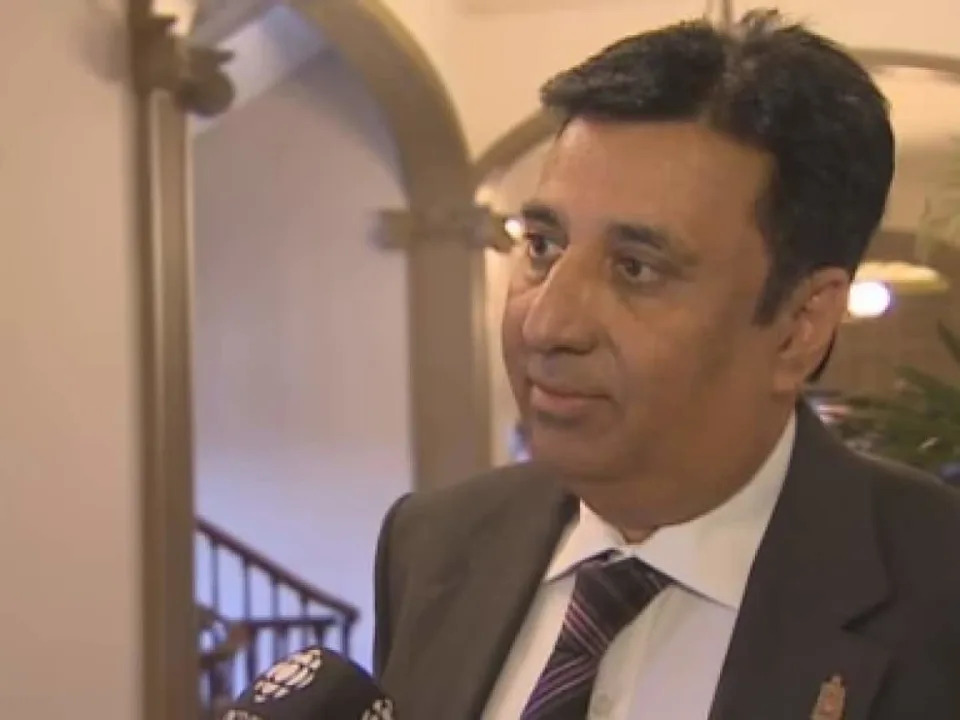Fri, March 3, 2023

UNIFOR president Lana Payne met with Windsor Star employees Friday as the last locally-printed issue of the paper was scheduled to roll off the press. (Dale Molnar/CBC - image credit)
The national president of Unifor decried the role of investment companies in labour relations Friday as she visited Windsor to support striking workers at Windsor Salt and soon-to-be laid-off workers at the Windsor Star printing press.
Lana Payne toured the printing press facility Friday as the last locally-produced issue of the Star was scheduled to roll off in the evening.
She also visited the Windsor Salt picket line.
About 250 workers at Windsor Salt went on strike on Feb. 17, saying the company would not address its financial requests until the union agreed to let it contract non-union employees to work in its salt mine.
"It's a challenge because the company was purchased by a hedge fund during the pandemic, and we all know the history of hedge funds and how they operate," Payne said.
We're at the point right now of defending the very existence of our union in that mine - Lana Payne, president of Unifor
"We're at the point right now of defending the very existence of our union in that mine. Because the proposals from the company, the concessions that they're talking about, would basically potentially wipe out our membership."
The union is bargaining with Windsor Salt for the first time since the company was bought by U.S.-based holding company Stone Canyon Industries in 2021.
CBC News contacted the company for comment on the strike on Thursday but never heard back.
The challenge of dealing with such holding companies is one that Windsor Star printing press workers can relate to, Payne said.
"Things started changing with Postmedia obviously when they were purchased by a hedge fund," she said.
"They have a different approach to business than if you were a local company committed to making sure you're preserving jobs in the community."
Postmedia is moving production of the paper to Toronto, leaving about 75 employees out of work, the union said.
In a previous statement to CBC News, Postmedia said that the move was part of "ongoing transformation initiatives" and that the building would be listed for sale.
"We are grateful for the work done by our dedicated colleagues. We are working with union representatives, in accordance with the collective agreement, to ensure a smooth transition," a spokesperson said.
Unifor Local 517-G president Colin Brian told CBC he doesn't see any hope for preserving the press jobs, but he said it's not too late to fight for local distribution jobs in the area.

Dale Molnar/CBC
"When they bring that paper down to Windsor, they still need to bring that paper out to corners. They still need someone to unload and load the trucks, and that's 517-G worker jobs," he said.
The workers have a good collective agreement with Postmedia, Payne said, and the union will work to ensure that the company honours that agreement when it comes to terms such as severance.
It has also asked Postmedia's president and CEO for assurances that the paper's archives will be preserved in Windsor, she added.
"There's 135 years of stories in these archives, including worker stories. This is a workers' town. This is a union town, it's a Unifor town. And many of the stories of our members are contained in those archives," she said.
Payne also used her visit to call on the federal government to improve Employment Insurance access and benefits and to protect local news jobs by passing Bill C-18, which would require companies like Facebook to compensate news organizations for content shared on their platforms.









